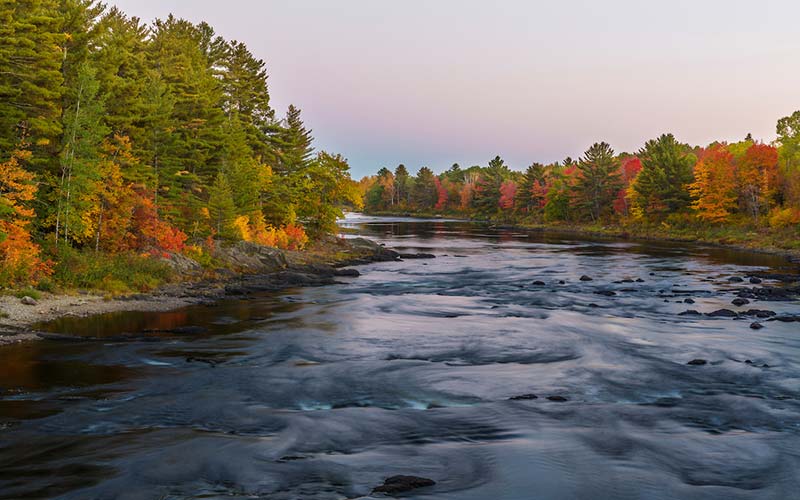
Among the bills under consideration is one that would establish a commission to review state-owned lands and waterways of significance to Maine's tribes – waterways like the Penobscot River (above). Photo: Ecophotograhy
Maine legislators have the unique opportunity to reset the state’s relationship with its indigenous tribes through three bills under consideration this legislative session. For centuries, Maine systematically oppressed its Wabanaki tribes – the Passamaquoddy Tribe, the Penobscot Nation, the Houlton Band of Maliseets and the Aroostook Band of Miqmaq, who together comprise the Wabanaki Alliance The passage of these bills is critical if Maine is ever to right those wrongs.
Here’s what’s on the table.
Restoring Tribal Sovereignty
What We Are Advocating For
In 1980, the Maine Indian Claims Resettlement Act stripped the state’s tribes of their sovereignty. However, the State failed to follow through on several aspects of the law – including creating a pathway for the Passamaquoddy Tribe and Penobscot Nation to each acquire up to 150,000 acres of trust land.
The Tribal Sovereignty Act (LD 1626) would reframe the relationship between the State and Maine’s tribes by placing the tribes on similar and equal footing to the 570 federally recognized tribes in the United States. It would restore the inherent right of the tribes to self-govern within their respective territories.
As we did when it was first introduced in 2020 (2020 testimony) and again in 2021(CLF 2021 testimony), CLF supports passage and enactment of the Tribal Sovereignty Bill.
What’s at Stake
The 1980 Settlement Act prevents tribes in Maine from exercising the right to self-governance as the vast majority of other tribes in the country do. The Tribal Sovereignty Act would restore this right to the Wabanaki tribes.
What to Watch For
Governor Mills has resisted passage of the Tribal Sovereigny Bill in the past, and it remains to be seen whether she will support the effort this year. Letters, emails and phone calls to Governor Mills and your state legislators to support LD 1626 will be critical to its success and enactment. So too are letters to the editor of your local or a statewide newspaper on behalf of your organization stating why you support LD 1626, and/or have board members/supporters do so on their own.
Ensuring Safe Drinking Water
What We Are Advocating For
It is simply unacceptable in this day and age that clean drinking water is not available to every community in Maine. Yet that is the reality for the Sipayak Community (Pleasant Point Reservation). The community’s current source of drinking water often has dangerously high levels of toxic chemicals after high winds and heavy rains. LD 906, An Act to Provide Passamaquoddy Tribal Members Access to Clean Drinking Water, is an emergency bill that would allow the Tribe to source their groundwater from land they already that is close to but outside the boundaries of Sipayak.
What’s at Stake
The chemicals found in the Tribe’s current water source – trihalomethanes – are known to cause cancer. At the same time, the 1980 Maine Indian Claims Settlement Act – the same bill at the center of the Tribal Sovereignty Bill above – makes it hard for Wabanaki Tribes tribes to put new land into a trust, hampering the Tribe’s ability to manage that land, as is the case for Sipayak Community.
What to Watch For
The Sipayak Community’s drinking water issues represent the larger failures of the 1980 Settlement Act. While passing LD 906 will solve the Passamaquoddy Tribe’s immediate issue, it will take implementation of the Tribal Sovereignty Bill to ensure a similar situation doesn’t happen again. Be sure to contact your state legislators to express your support for LD 906.
Recognizing Lands of Significance to Wabanaki Tribes
What We Are Advocating For
Another step the State can take to repair relations with the Wabanaki tribes is to develop a deeper understanding of the state-owned land and waterways that are significant to them. A bill before the legislature, An Act to Review State Lands and Waterways That Have Sacred, Traditional or Other Significance to the Wabanaki Tribes (LD 1907), would start that process.
What’s at Stake
Only with a shared understanding between the State and the tribes can there be a respectful dialogue about how to restore meaning and access to these lands in ways that pay proper homage to their original stewards, the Wabanaki.
What to Watch For
Unlike the drinking water bill, this bill’s fate is not directly tied to The Tribal Sovereignty Bill, as it would establish only a process and not a result. However, the Tribal Sovereignty bill did start out with a process for reviewing the Maine Indian Claims Settlement Act. Similarly, this bill create a process that could, and should, lead to action concerning restoring Wabanaki access to lands that have sacred, traditional or other significance to the tribes.
Help Us Move This Critical Work Forward
Over the coming months, CLF advocates will be in and out of the state house working with legislators and pushing forward these critical bills. But we know that your voice is the most powerful for lawmakers to hear. Please, sign up for our email alerts so you’ll be the first to know when you can make a difference by speaking up.



